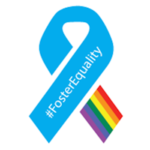
This post is from Appleseed Child Welfare intern Skyler May.
In the past few months, Nebraska Appleseed has written extensively about the Preventing Sex Trafficking and Strengthening Families Act (or “SFA”) and the recently released report, “Letting Kids Be Kids: Nebraska’s Implementation of the Strengthening Families Act” which includes implementation recommendations from more than 300 stakeholders and young people.
When these stakeholders were asked what cultural considerations should be reflected in the recommendations for normalcy activities, many acknowledged the importance of gender identity and sexual orientation, freedom, and acceptance. Oftentimes, youth in foster care who identify as Lesbian, Gay, Bisexual, Transgender, and Queer/Questioning (“LGBTQ”) face environments of misunderstanding, misrecognition, and even discrimination. LGBTQ foster youth experience stressors relating to homophobia and transphobia, and must evaluate the safety of their surroundings in order to decide whether to disclose their LGBTQ identity. These youth need a safe place in which they can process their feelings, structure to support their development, and freedom to express their identity. LGBTQ foster youth, just like any youth, need a stable and supportive environment that is dedicated to ensuring a happy and healthy life.
A recent Associated Press article reports on the champions of LGBTQ youth support within the child welfare system. The article shares the story of Delilah, who like too many LGBTQ youth, was rejected by her family then went on to face prejudice, harassment and abuse in the foster care system. In New York, the Administration for Children’s Services developed an Office of LGBTQ Policy & Practice, as a response to a growing need for additional support for LGBTQ youth.
In addition, the administration has set high standards for their partner agencies and foster parents in order to ensure that LGBTQ youth are afforded the same opportunities and experiences as their peers. Last year, they began requiring LGBTQ-oriented training for all staff at nonprofit partner agencies. Additionally, all newly certified foster parents are required to pledge to provide an “affirming, supportive home for LGBTQ youth.” Other states are following New York’s lead in supporting LGBTQ youth in foster care. Iowa recently launched its first LGBTQ-oriented training program for child welfare workers, which included a former foster youth.
If youth in foster care who are LGBTQ are able to reach their full potential to become healthy and happy adults, they need stable and supportive environments. The stakeholder group will be meeting in the coming months to consider these topics in addition to other identified issues for further discussion and to continue collaborating to maximize opportunities for youth under the SFA in Nebraska. For additional resources on how the SFA can promote the wellbeing of all youth in care, check out this guide from The Center for the Study of Social Policy.

